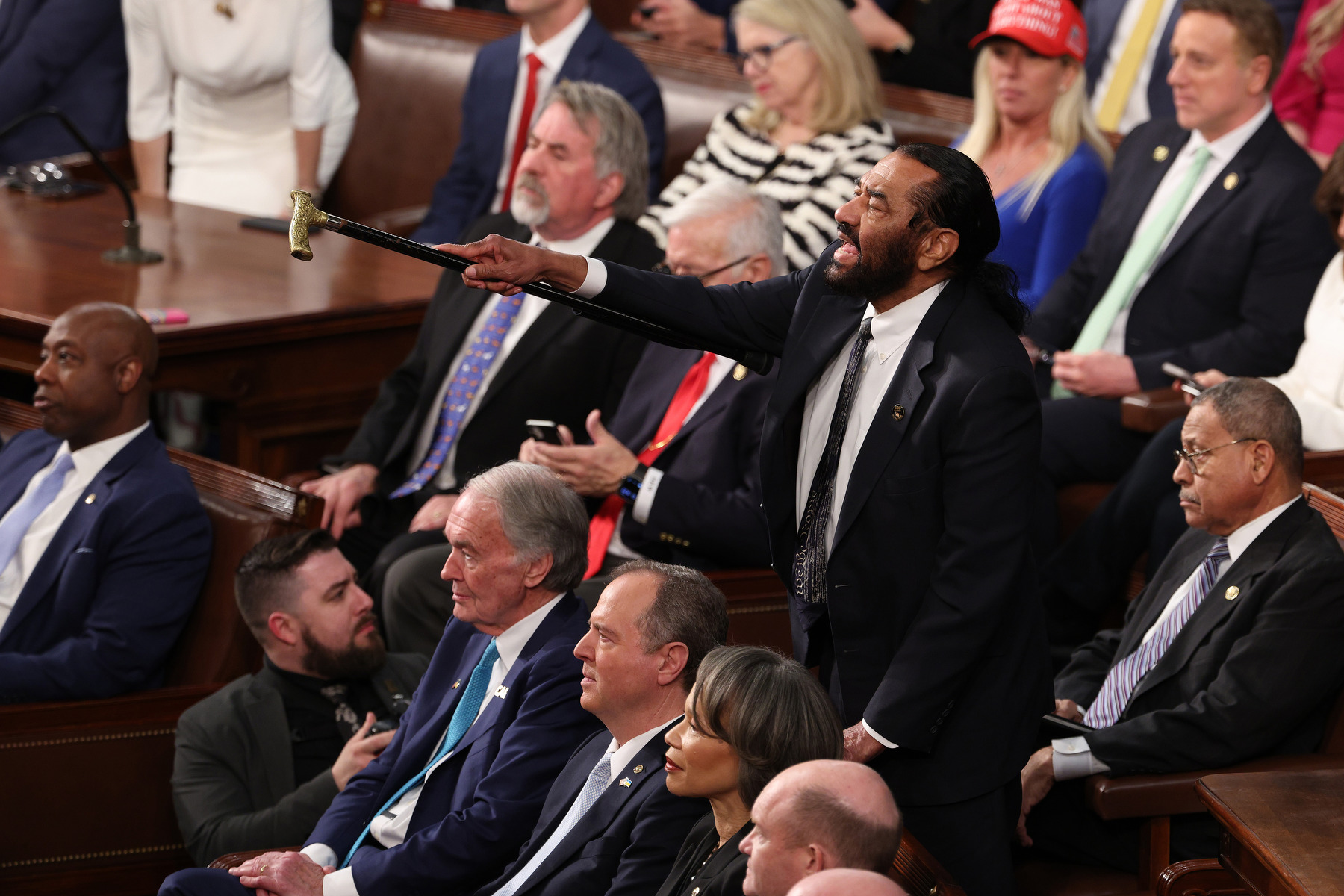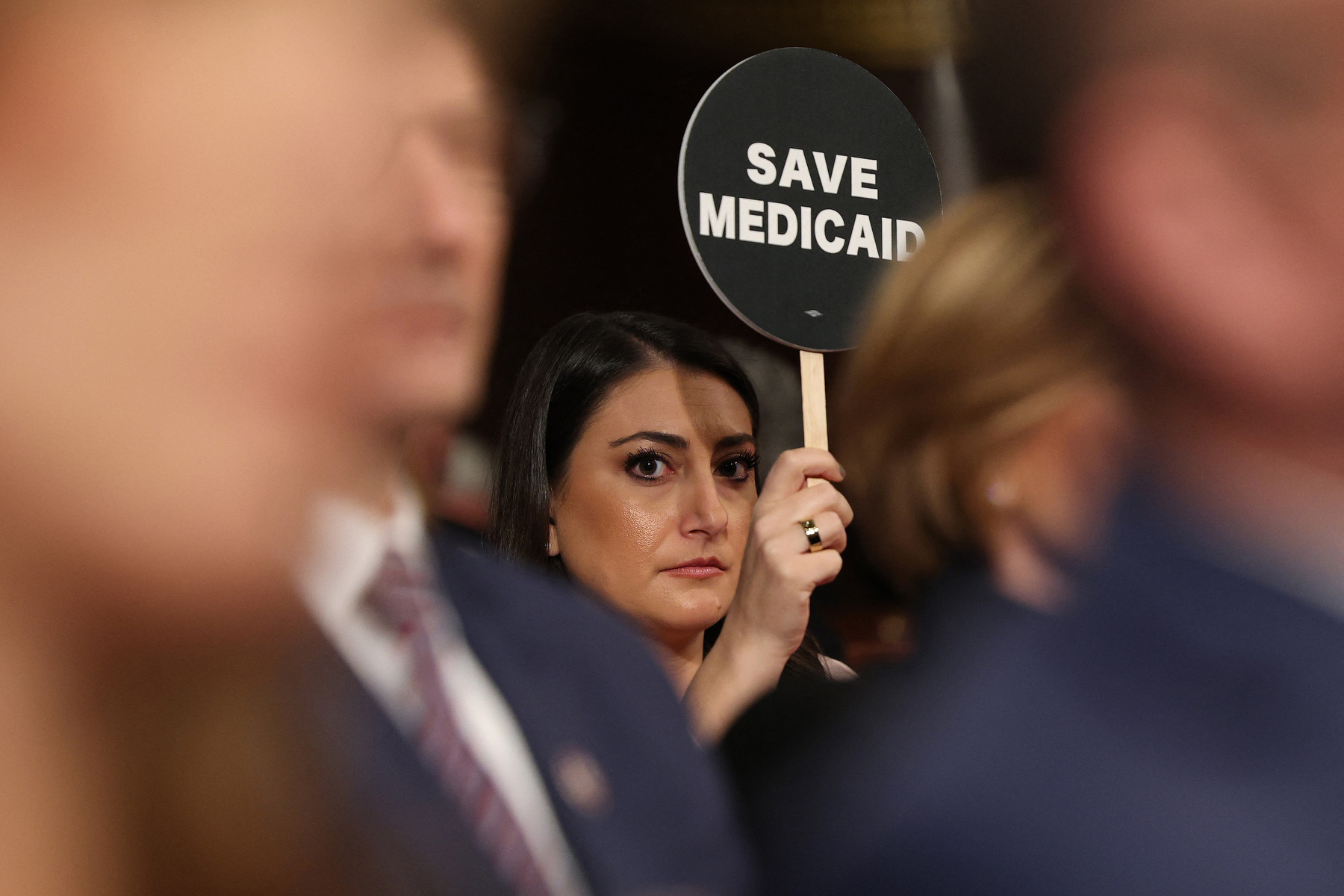Editor’s note: This article has been updated to include an assessment of the budget by the nonpartisan Congressional Budget Office.
It was just five minutes into President Donald Trump’s first second-term address to a joint session of Congress Tuesday night when Rep. Al Green began to shout, “No mandate!” The Texas Democrat was then escorted off the House of Representatives floor.
Green said he was protesting deep cuts expected to Medicaid, the government’s health and long-term care insurance program for lower-income Americans. The cuts are included in a deal the Republican-controlled Congress has been hashing out to make permanent Trump’s 2017 tax cuts, which largely benefited corporations and the wealthy and are set to expire at the end of this year.
“It’s worth it to let people know that there are some people who are going to stand up” for the very popular federal-state program that insures more than 70 million Americans, Green told reporters.
Some of Green’s Democratic colleagues, including Reps. Sara Jacobs of California and Veronica Escobar of Texas, lifted “Save Medicaid” placards at various points during the president’s more than hour-and-a-half address. Trump, for his part, did not mention Medicaid, but he said the “next phase of our plan to deliver the greatest economy in history is for this Congress to pass tax cuts.”
Here is what to expect as Republicans begin what could be a months-long process to enact Trump’s tax and spending agenda and why they are pursuing hundreds of billions of dollars in cuts to the Medicaid program. Trump said just last week that he would not touch it, except for looking for ways to curb fraud and abuse in the program, which disproportionately serves women and children.
What is the status of GOP budget negotiations?
The House approved a budget proposal last week that included $4.5 trillion in tax cuts and would reduce federal spending by at least $1.5 trillion; all Democrats and one Republican voted against it. The Senate had passed its own budget resolution the previous week. Both budget proposals provide top-line numbers; relevant congressional committees will negotiate details about specific programs like Medicaid in the coming weeks. Trump has said he wants to see it all folded into one “big, beautiful bill.”
Before that can happen, though, since the budgets passed by the two chambers are different, the House and Senate will need to come to an agreement and approve the same budget framework before moving onto the next step.
Republicans ultimately aim to enact Trump’s tax and spending agenda via a simple-majority vote in the Senate. To do that, they plan to adhere to a set of rules specific to budget legislation that allows them to bypass the 60-vote filibuster and get the package through Congress without the need for Democratic support.

What are lawmakers saying about Medicaid?
When the Senate voted on its budget resolution last month, Democrats floated an amendment that would have blocked tax cuts for the wealthy if Medicaid funding was reduced. Their effort had support from Republican Sens. Josh Hawley of Missouri and Susan Collins of Maine, who chairs the appropriations committee, but ultimately failed.
After the House passed its version of the budget, Speaker Mike Johnson told CNN’s Kaitlan Collins that capping per-capita Medicaid spending was “off the table” and that desired savings could be achieved in part by imposing work requirements on beneficiaries. “What we are going to do is go into those programs and carve out the fraud, waste and abuse, and find efficiencies,” the Republican from Louisiana said.
When GOP senators held a private meeting this week, Majority Leader John Thune, of South Dakota, warned them that they would have to “make hard choices” on a number of issues, including Medicaid, and that the process was “not gonna happen overnight,” according to Punchbowl News, which covers Washington.
Federal and state Medicaid spending totaled $880 billion in the 2023 fiscal year. Republicans have long sought to trim the overall price tag of the program by imposing work requirements or rooting out fraudulent claims.
Andrea Ducas, a vice president of health policy at the liberal-leaning Center for American Progress, said that one problem with work requirements as a route to program savings is that even if beneficiaries “go back to work, they’re still on Medicaid, and you don’t get your savings, so the only way Medicaid work requirements produce a budget savings is if it kicks people off the program.” She added that the “vast, vast majority of people on Medicaid who can work are already working.”
In 2023, 92 percent of Medicaid recipients under the age of 65 who were not receiving disability benefits were working, according to KFF, a nonprofit, nonpartisan organization focused on health policy. Congress’ research arm concluded that Medicaid work requirements would lead to drops in enrollment and consequently program costs, but would not lead to increased employment. The Government Accountability Office (GAO) estimated that there was about $50.3 billion in improper Medicaid payments in fiscal 2023 — but that figure does not approach the $880 billion that House Republicans told the Energy and Commerce Committee to cut from the programs they oversee over the next decade.
-
Read Next:
Why would the $880 billion in spending cuts come from Medicaid?
Put simply: The math otherwise does not add up.
As Republican leaders have pointed out, the GOP House proposal does not call for $880 billion to be cut from the Medicaid program specifically. Budget resolutions set broad directives for committees and then committees hammer out the details of spending for programs under their jurisdiction.
Medicaid and Medicare, the government health insurance program for Americans over 65, are both under the jurisdiction of the Energy and Commerce Committee. Republicans, including Trump, have campaigned on promises to not cut Medicare. Roughly 95 percent of the non-Medicare federal spending directed by the committee goes to Medicaid.
For that reason, “you cannot get $880 billion of cuts from that committee without cutting Medicaid,” said Michael Linden, who worked at the Office of Management and Budget (OMB) during the Biden administration and before that in the Senate.
Linden, who is now the campaign director for Families Over Billionaires, a coalition of labor unions and progressive organizations recently formed to educate the public about Trump’s tax and spending agenda, said it was “disingenuous” for House Republicans to say their budget proposal would not require deep cuts to Medicaid to make the math work.
The Congressional Budget Office, a nonpartisan entity that acts as Congress’ bookkeeper, confirmed late Wednesday that it would not be possible to finance Trump’s tax agenda without cutting Medicaid or Medicare.
-
Read Next:
What do voters think about all of this?
Medicaid is very popular with Americans. KFF polling ahead of Trump’s inauguration showed that 77 percent of U.S. adults viewed the program favorably, including 63 percent of Republicans.
Trump’s spending agenda — and the Elon Musk-directed Department of Government Efficiency (DOGE), charged by the president with reducing government spending — has prompted blowback at recent events held by GOP lawmakers, with concerns about Medicaid cuts specifically raised by attendees. Rep. Richard Hudson of North Carolina, who heads the GOP campaign arm that elects House members, reportedly told colleagues in a recent meeting that they should stop doing in-person town halls and instead hold online events that can be more easily controlled.
Families Over Billionaires will continue running ads in the coming weeks about Trump’s tax and spending agenda, including potential cuts to Medicaid, aimed at voters in swing states and districts.








